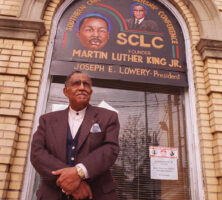Joseph Lowery was a distinguished civil rights leader and respected Methodist minister who, along with Martin Luther King Jr., helped to organize the Southern Christian Leadership Conference (SCLC). Referred to as the “dean of the civil rights movement,” Lowery served as SCLC president from 1977 to 1997. He was a key figure in the desegregation of the United States and, after integration was achieved, focused his attention on other significant issues, such as Black voter registration, affirmative action, public health, and workers’ rights.
Background and Early Career
Joseph Echols Lowery was born in Huntsville, Alabama, on October 6, 1921, to Dora and LeRoy Lowery, a teacher and a small businessman, respectively. His childhood experiences included confrontations with abusive police officers, the Ku Klux Klan, and prejudiced neighbors. These experiences helped shape his social conscience. Lowery graduated from high school in 1939 and was educated at several colleges, including Knoxville College in Tennessee, Wayne State University in Michigan, Payne College and Theological Seminary in Ohio, and the Chicago Ecumenical Institute. After graduating from seminary in 1950, he was ordained as a Methodist minister and received his first assignment, which took him to Mobile, Alabama. From 1952 to 1961 Lowery was pastor of Warren Street United Methodist Church (UMC) in Mobile.
Lowery and the Civil Rights Movement in Alabama
In 1955, in Alabama’s capital, Montgomery, a Black woman named Rosa Parks sparked the Montgomery Bus Boycott when she refused to relinquish her bus seat to a white man. Inspired by the progress in Montgomery, Lowery led a successful drive against the segregated bus system in Mobile. Hoping to build upon these victories, Lowery and other Black southern ministers met in Atlanta at Ebenezer Baptist Church. Their aim was to form an organization that would supply the civil rights movement with sustaining leadership. The result was the creation of the SCLC, of which Lowery was elected vice president.
In 1959 Lowery, Ralph David Abernathy, Fred Shuttlesworth, and Solomon Seay were sued for libel by the state of Alabama. Though innocent, the four ministers were found guilty and ordered to pay $3 million. Much of Lowery’s personal property was seized. This ruling was later reversed by the U.S. Supreme Court. Along with his fellow activists Lowery was subjected to violence from the police and militia—notably, during the 1965 march from Selma to Montgomery—and was imprisoned many times.
Atlanta Ministry
In 1968, the year King was assassinated, Lowery was transferred from Birmingham to southwest Atlanta to assume the pastorship of Central United Methodist Church. The previous year he had been named chairman of the board of the SCLC, and in 1977 he succeeded Abernathy as president of the organization, which was then in decline. While maintaining a successful church ministry, he recruited new SCLC members and involved the organization in pertinent issues affecting Black Americans: police brutality, global human-rights struggles, voter registration, and the burning of Black churches.
From 1986 until his retirement in 1992, Lowery was pastor of Cascade United Methodist Church in Atlanta. During his tenure Cascade’s membership grew by 1,000, church funds increased to $1 million, and the church purchased land and began building a new facility. He also cochaired the 1990 visit to Atlanta of Nelson Mandela, leader of the anti-apartheid movement in South Africa; spearheaded the construction of 240 low- and moderate-income housing units; and served as a board member of MARTA, Atlanta’s public transportation system, for more than two decades.
After his retirement from the ministry, Lowery remained active in civic affairs. As the MARTA board’s chairman during the 1996 Olympic Games, he was influential in securing millions of dollars of funding. As a leader of the Coalition to Change the Georgia Flag, he played a crucial role in efforts to modify the design of Georgia’s state flag, which prominently featured the Confederate battle flag. Although that crusade encountered bitter opposition, the supporters of change eventually prevailed.

Courtesy of Atlanta Journal-Constitution.
In his later years, Lowery also remained a prominent figure in the struggle for equality and justice. At the funeral of Coretta Scott King in 2006, Lowery used his turn at the pulpit to criticize the Iraq War (2003-2011), speaking out to both a national audience and to U.S. president George W. Bush, who was in attendance.
Lowery received much recognition for his accomplishments. In 2001 Clark Atlanta University established the Joseph E. Lowery Institute for Justice and Human Rights. He received several honorary doctorates, a Lifetime Achievement Award from the National Association for the Advancement of Colored People, and dozens of other humanitarian awards.
In January 2009 Lowery delivered the benediction for the inaugural ceremony of U.S. president Barack Obama. That same year, he was awarded the Presidential Medal of Freedom.
Joseph Lowery died on March 27, 2020, at his home in Atlanta.








